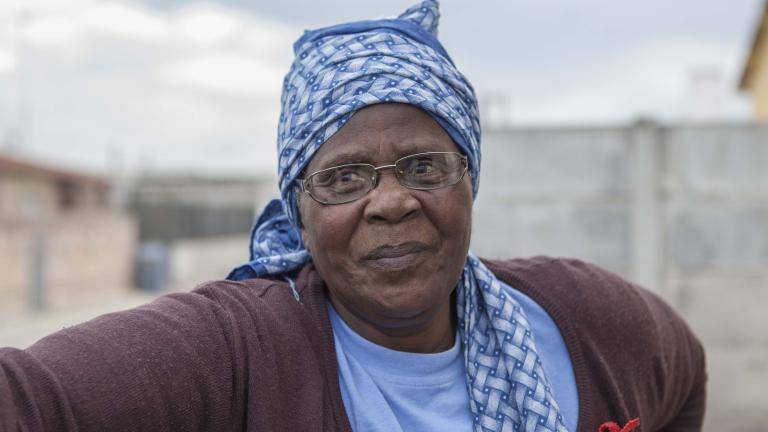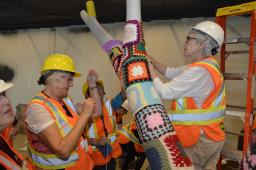As the years passed, Tyophol refrained from speaking about her son or his wife, in the hopes that her grandchildren would be able to forget the pain of losing their parents. They didn’t forget, however, and the sorrow and anger was eating her up inside, too.
One day last year, a friend invited Tyophol to attend a meeting of Grandmothers Against Poverty and AIDS (GAPA) – an activist and support group for grandmothers dealing with the devastating effects of HIV/AIDS. Tyophol was reluctant at first, but eventually agreed to go.
"That first day I met those grannies I got a shock. I heard them talking about their stories – no one was hiding anything. There was even a woman there who was living with the disease that killed my son…. And suddenly it is my turn and I start telling them about what has happened to me. That I have lost my child through this thing, this HIV. You notice that this word, “HIV,” doesn’t come out of my mouth easily. For so many years, no one dared to say this word. But at GAPA I suddenly found myself saying that word out loud. And then I cried, I cried, and I cried. Afterwards I felt very light, and when I came home, I was happy because I felt that I had taken this heavy thing that was in me and given it to those grandmothers. The clot that was blocking my heart was gone."
Tyophol is now travelling across Canada to share her story, which is included in the new book: Powered by Love: A Grandmothers’ Movement to End AIDS in Africa. The book shares the stories of many other African grandmothers whose lives have been affected by HIV/AIDS. The disease is a global scourge and is particularly bad in Africa. According to the World Health Organization (WHO), in 2016 there were 25.6 million people in Africa living with HIV. The United Nations reports that as of 2015, over 10 million children in sub‐Saharan Africa had lost one or both parents to AIDS. In South Africa, where Tyophol lives, more than 2.3 million children have been orphaned by HIV/AIDS.
Many of these orphans live in households led by a grandmother like Tyophol, who are now raising Africa’s next generation. Many of them, like the women at GAPA, are also working together to support each other and raise awareness of HIV/AIDS. African grandmothers are powerful advocates, fighting for the right to health that is enshrined in Article 25 of the Universal Declaration of Human Rights. Tyophol explains the importance of the work she does with other grandmothers by noting: "You cannot stay a victim when you realize you are just one of many. Instead you think, we can do something together to make change. Together we are powerful, not just one old granny."
African grandmothers are at the frontlines of the struggle against HIV/AIDS, and Powered by Love celebrates their contributions to ending the pandemic. Author Joanna Henry and photographer Alexis MacDonald visited eight African countries, where they interviewed and photographed hundreds of grandmothers. Their amazing stories of courage and resourcefulness are meant to inspire, but also to allow readers to understand what it means to combat the HIV/AIDS epidemic at the ground level.
Powered by Love is a creation of the Grandmothers Campaign, a Canadian movement created in 2006 by the Stephen Lewis Foundation. The campaign, now 10,000 strong, enables Canadian grandmothers to work in solidarity with their African counterparts. Since 2006, over $25 million has been raised for African grandmothers and their grassroots organizations.
The Grandmothers Campaign is featured inside the Canadian Museum for Human Rights, in the form of a yarn‐bombed tree. The exhibit is based on a real tree outside the Hillcrest AIDS Centre in Durban, South Africa, that was yarn‐bombed by African grandmothers on World AIDS Day in 2012. It was meant as a symbol of hope and a reminder of families in need.
Today, there are still families in need and there is still work to be done. This is why Tyophol is travelling across Canada telling her story – and why Powered by Love is sharing the stories of countless other grandmothers. Their strength and determination show us all that to end the HIV/AIDS pandemic, we need to listen to and support grandmothers like Tyophol. These powerful women form the frontline in our battle against the disease. By raising their families, supporting their communities and asserting their own dignity, African grandmothers are protecting the human rights of all of us.
Author
Matthew McRae worked at the Museum as Researcher and as Digital Content Specialist.

